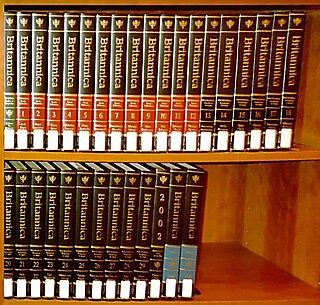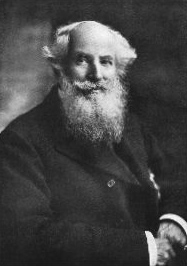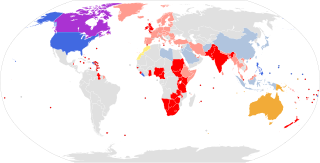
A dictionary is a listing of lexemes from the lexicon of one or more specific languages, often arranged alphabetically, which may include information on definitions, usage, etymologies, pronunciations, translation, etc. It is a lexicographical reference that shows inter-relationships among the data.

An encyclopedia, or encyclopædia is a reference work or compendium providing summaries of knowledge either general or special to a particular field or discipline. Encyclopedias are divided into articles or entries that are arranged alphabetically by article name or by thematic categories, or else are hyperlinked and searchable. Encyclopedia entries are longer and more detailed than those in most dictionaries. Generally speaking, encyclopedia articles focus on factual information concerning the subject named in the article's title; this is unlike dictionary entries, which focus on linguistic information about words, such as their etymology, meaning, pronunciation, use, and grammatical forms.

The Oxford English Dictionary (OED) is the first and foundational historical dictionary of the English language, published by Oxford University Press (OUP). It traces the historical development of the English language, providing a comprehensive resource to scholars and academic researchers, as well as describing usage in its many variations throughout the world.

The Surgeon of Crowthorne: A Tale of Murder, Madness and the Love of Words is a non-fiction history book by British writer Simon Winchester, first published in England in 1998. It was retitled The Professor and the Madman: A Tale of Murder, Insanity, and the Making of the Oxford English Dictionary in the United States and Canada.

William Chester Minor, was an American army surgeon, psychiatric-hospital patient, and lexicographical researcher.

Pussy is a used as a noun, an adjective, and—in rare instances—a verb in the English language. It has several meanings, as slang, as euphemism, and as vulgarity. The most common as a noun, it means "cat", as well as "coward or weakling". In slang usage, it can mean "the human vulva or vagina" and less commonly, as a form of synecdoche, meaning "sexual intercourse with a woman". Because of its multiple senses including both innocent and vulgar connotations, pussy is often the subject of double entendre.

Frederick James Furnivall was an English philologist, best known as one of the co-creators of the New English Dictionary. He founded a number of learned societies on early English literature and made pioneering and massive editorial contributions to the subject, of which the most notable was his parallel text edition of The Canterbury Tales. He was one of the founders of and teachers at the London Working Men's College and a lifelong campaigner against injustice.
Henry Bradley, FBA was a British philologist and lexicographer who succeeded James Murray as senior editor of the Oxford English Dictionary (OED).
A demonym or gentilic is a word that identifies a group of people in relation to a particular place. Demonyms are usually derived from the name of the place. Demonyms are used to designate all people of a particular place, regardless of ethnic, linguistic, religious or other cultural differences that may exist within the population of that place. Examples of demonyms include Cochabambino, for someone from the city of Cochabamba; French for a person from France; and Swahili, for a person of the Swahili coast.
Many languages have words expressing indefinite and fictitious numbers—inexact terms of indefinite size, used for comic effect, for exaggeration, as placeholder names, or when precision is unnecessary or undesirable. One technical term for such words is "non-numerical vague quantifier". Such words designed to indicate large quantities can be called "indefinite hyperbolic numerals".

Sir James Augustus Henry Murray, FBA was a Scottish lexicographer and philologist. He was the primary editor of the Oxford English Dictionary (OED) from 1879 until his death.

Herbert "Herbie" Coleridge was an English philologist, technically the first editor of what ultimately became the Oxford English Dictionary. He was a grandson of the poet Samuel Taylor Coleridge.

Simon Winchester is a British-American author and journalist. In his career at The Guardian newspaper, Winchester covered numerous significant events, including Bloody Sunday and the Watergate Scandal. Winchester has written or contributed to more than a dozen nonfiction books, has written one novel, and has contributed to several travel magazines, among them Condé Nast Traveler, Smithsonian Magazine, and National Geographic.

A faggot, in the meaning of "bundle", is an archaic English unit applied to bundles of certain items. Alternate spellings in Early Modern English include fagate, faget, fagett, faggott, fagot, fagatt, fagott, ffagott, and faggat. A similar term is found in other languages.
Etymology is the study of the history of the form of words and, by extension, the origin and evolution of their semantic meaning across time. It is a subfield of historical linguistics, and draws upon comparative semantics, morphology, semiotics, and phonetics.
Folk etymology is a change in a word or phrase resulting from the replacement of an unfamiliar form by a more familiar one. The form or the meaning of an archaic, foreign, or otherwise unfamiliar word is reinterpreted as resembling more familiar words or morphemes.
The word(s) of the year, sometimes capitalized as "Word(s) of the Year" and abbreviated "WOTY", refers to any of various assessments as to the most important word(s) or expression(s) in the public sphere during a specific year.

Despite the various English dialects spoken from country to country and within different regions of the same country, there are only slight regional variations in English orthography, the two most notable variations being British and American spelling. Many of the differences between American and British English date back to a time before spelling standards were developed. For instance, some spellings seen as "American" today were once commonly used in Britain, and some spellings seen as "British" were once commonly used in the United States.












